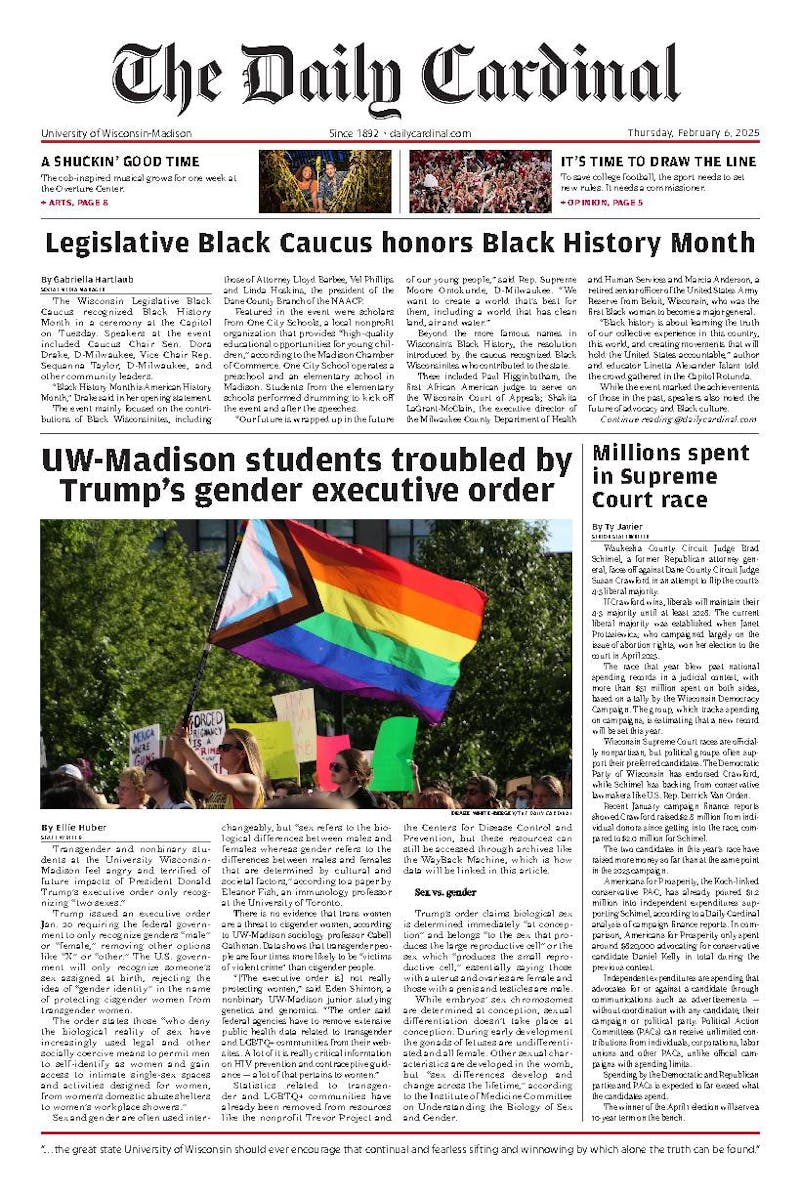While many of you were partying on the beach, enjoying the weather turn in Madison or elsewhere on your spring break, last Thursday I found myself in the House of Parliament in London, listening to British Foreign Secretary William Hague give a speech and entertain debate on the conflict in Libya. Colonel Muammar Qaddafi's forces steadily gained ground over recent weeks, forcing the hand of the international community to respond to ongoing atrocities against civilians and rebels. The Libyan ruler, who rose to power at the age of 27 following a military coup in 1969, has vowed to ""cleanse Libya house by house"" until the uprising of ""rats"" and ""cockroaches"" has been squashed.
This dehumanizing language, eerily similar to that of the Hutu Regime preceding the Rwandan genocide, is serious cause for concern.
There is no debate on the immorality of the actions of the Qaddafi regime. The international community has uniformly rejected violence carried out against civilians and protesters that has left thousands dead, with the United Nations Security Council voting unanimously to impose strict sanctions in late February. Since then, however, there has been tense debate over the merits of international intervention in Libya. With Qaddafi forces moving ominously toward the opposition stronghold in Benghazi and the democratic revolutionaries at their breaking point, the UN approved a resolution allowing for a no-fly zone in Libya. It authorizes member states ""to take all necessary measures … to protect civilians and civilian populated areas under threat of attack in the Libyan Arab Jamhariya, including Benghazi, while excluding an occupation force."" The resolution was spearheaded by France and Great Britain, though final support from the United States was crucial for its passage.
President Barack Obama has been rightfully wary of engaging the United States in another costly intervention in the region. He has steadfastly issued firm warnings to the dictator Qaddafi, treading a fine line between protecting American national security and acting on his democratic ideals. While the recent shift from strong words to military action is bold, the president is displaying international savvy in allowing France, Great Britain and Arab nations to take the lead on military action. The exclusion of an occupying force in the resolution is also important.
With Qaddafi betraying his promise of a ceasefire, his forces are currently invading the opposition stronghold in Benghazi and the international intervention is underway. Success is far from guaranteed. Without an occupying force, the intervention is limited in the support it can provide from the air. The war will still have to be won by the opposition forces on the ground, a tall order for relatively unorganized revolutionaries.
Regardless of the final outcome, the Obama administration's actions lie in stark contrast to the Bush administration's in Iraq. The Bush administration carried out a massive public opinion campaign to shore up support for invasion of Iraq and snubbed the United Nations, as well as U.S. intel—suggesting weapons of mass destruction may not be present in order to unilaterally invade the country with occupying forces.
Playing chess, not checkers, Obama and Secretary of State Hillary Clinton seem to understand the complex nuances and implications of intervention in the region. Rather than paint over a colorful canvass in broad strokes of black and white, they have chosen to engage in a public debate over the merits of a military response.
While the no-fly zone and airstrikes may not be enough to save the revolution in Libya, Obama's sophisticated understanding of international relations has put the United States in a favorable situation with respect to the conflict. By taking a backseat to European and Arab nations geographically and economically closer to the civil war, he has avoided the perception of America as a world police force—a role we cannot continue to play in the modern world of fiscal austerity and globalized movement toward economic parity. By not deploying an occupying force but still sending a strong message of support for democratic revolutionaries in North Africa and the Middle East, Obama has continued to deftly walk the fine line between ensuring national security and supporting freedom abroad.
Regardless of where you stand on the administration's domestic policies, there is ample reason to trust our Commander-in-Chief to protect American interests and ideals around the world.
Ray Kluender is junior majoring in political science and economics. Please send all feedback to opinion@dailycardinal.com.





